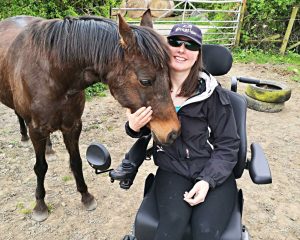Share a story – Holly Moscrop

It’s been over 10 years since I first developed M.E. You’d think by now I’d have an explanation about it ready to roll off my tongue as soon as anyone asks a question, but most of those 10 years have been spent in my bedroom, so my people skills are a tad rusty.
I’ve been incredibly lucky that over the years, thanks to the privilege of being able to pace and rest, having a brilliant support network in my parents, access to good medical care and energy-saving aids and adaptations, and a hefty dose of luck, I’ve seen tiny, gradual improvement that’s built up to move me out of the Severe category and tentatively into Moderate. For which I’m forever grateful. But being able to leave my bedroom and sometimes be out in the outside world has inevitably meant meeting new people, and as any other wheelchair users know, that usually comes with questions.
“What’s M.E.?” people often ask, and for a minute, I’m lost for words. How do I really tell them what M.E. is in a succinct, snappy way?
What I want to tell them is it’s the disease that plucked a 16-year-old me from her final year of school and locked her in her bedroom, taking away her chance to sit the GCSEs she’d worked so hard for or wear the prom dress hanging in her wardrobe.
It’s an illness that took away those teenage rites of passage like learning to drive, buying my first drink, sitting A levels and going to university, having my first date or relationship, going to a club or festival, living away from home, getting a job… all those life events that didn’t get the chance to be ticked.
I want to tell them that alongside the standard list of symptoms is a sea of grief for all that could have been. That each time I watch a friend go off to uni or get a job… a house… a partner… a family… it drags me underwater for a while.
I want to say it’s a condition that keeps you on the side-lines of everyone’s lives. Where you watch from a distance as their lives move at what seems like a million miles an hour, while yours takes all the winding lanes and backroads.
That it affects every aspect of your life from the hobbies you once had to the ability to wash yourself whenever you want to. That everything you do comes with sacrificing something else, often costing you a lot more than it was worth.
I want to say that the muscle weakness from lack of energy at a cellular level stretches so much further than weak arms and legs. It covers every muscle in your body from your eye muscles, to your ability to swallow, to the muscles that work your bladder.
I want to tell them how light burns holes in my brain, sucking out what energy I have and leaving me filled with nausea. How my cheeks, chest and hands set themselves on fire after a day of what my body decides was too much exertion, and there’s not a single moment without pain.
I want them to know the bone-crushing fatigue and post-exertional malaise means I’ve missed saying final goodbyes to far too many loved ones. People who were there for me for most of my life who I couldn’t be there for at the end of theirs. It’s meant I hardly know any family members who were born in the last 10 years, and that my best friends have homes I’ve never visited and partners I’ve never met.
I want to say it’s a disease that stole my dreams and meant I had to reshape them into new ones.
I need them to realise there’s millions of others who could also say all of this and more. Many who wouldn’t be able to because they are too ill to leave their beds or even speak, and some who have even lost their lives entirely.
I don’t want their pity or sympathy; I want them to know I have a full and happy life within the limits I’ve been handed. That it’s an illness that teaches you to find endless joy in all the little things most people miss and build your happiness from things it can’t take away. But I also want them to understand the true, devastating depth of it.
But mostly, I stumble over my words about it being a chronic condition with lots of debilitating symptoms… Then they leave, or move the conversation on, and I think about all those other things I wish I could’ve explained to them. Maybe in another 10 years I’ll have a better answer for them, or maybe I won’t need it because all of us working to raise awareness, like everyone here at Smile for M.E., will have already made the stranger on the street aware of the true impact of M.E.
By Holly Moscrop
Instagram @onegirlandhercows
Website onegirlandhercows.co.uk
